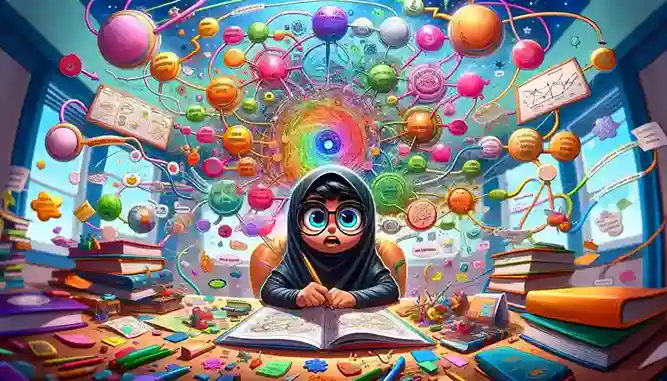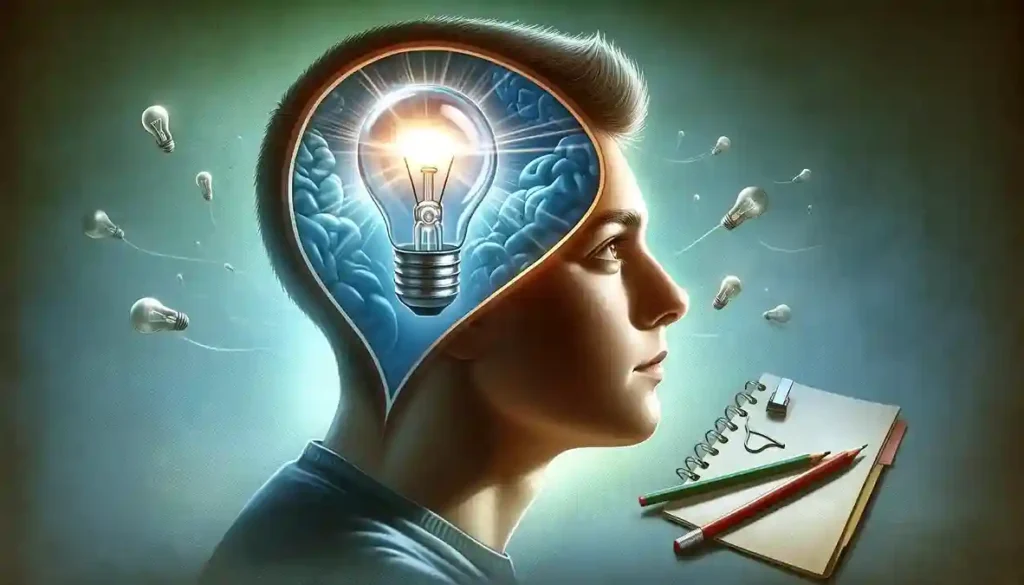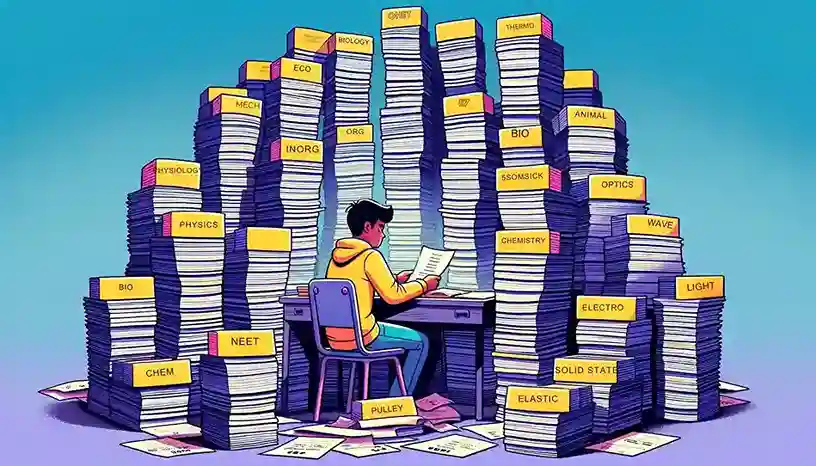What exactly are concepts? How Can You Build a Strong Foundation for NEET?

What exactly are concepts? How Can You Build a Strong Foundation for NEET?
Hello, future doctors! When you’re studying for the NEET, have you ever felt like you were lost in the world of concepts?
Rest assured, I am here to guide you through the maze of ideas and unveil the key to becoming an expert in them.
Concept Identification: The Actual Thing

What exactly is a “CONCEPT”?
My lecturers would frequently tell me, “Priyal, you don’t have clear concepts and na hi tumhare basics clear hai, you need to work on them,” without clarifying what they meant.
So one day I became upset. And I conducted some research.
Here’s what I discovered:
“Concepts are the building blocks of knowledge.” They’re similar to puzzle pieces that fit together to build a larger image.”
In other words, if you don’t understand the fundamentals, you won’t be able to tackle any decent, advanced, multifactorial problem.
However, the concept of essentials varies depending on the NEET subject.
Let me illustrate with several examples:
Application of Laws in Physics.
- If you don’t know how to apply the second rule of motion, where it applies and where it doesn’t, your fundamentals aren’t clear.
- Because when you attempt questions, you may overlook a little theory fact or make a numerical error. There are numerous good numerical questions around the third law as well.
- There are numerous chapters in physics, such as heat, solids, and fluids, where if you don’t understand the theory, your fundamentals are unclear. Because there are a lot of theoretical questions within these chapters.
- For example, “If there are no heat losses to the surroundings, the quantity of heat gained by the cold body is equal to the quantity of heat lost by the hot body.” If you forget the first half of this law, the examiner will simply offer you “heat lost to the surrounding environment in the question” and you will utilize it in the calculation process.
- Many concepts from one unit of physics may be applied to other units, such as heat and electricity, electricity and magnetism, SHM and wave theory, and so on.
Application of Concepts in Chemistry
- In chemistry, particularly organic chemistry, if you don’t know all of the exceptions, complexities, and mechanisms of each group, your fundamentals are unclear. You can’t use one mechanism everywhere.
- “Easy-looking questions” at times are the theory aspects of chemistry and physics. You just have to memorize them and use these ideas and facts to answer numerical problems or inquiries. And these types of NCERT theory-based questions have steadily increased in the past 5 years.
- Thermodynamic principles differ in chemistry and physics; if you don’t distinguish between them, you’ll constantly make errors.
How Do You Know If Your Concepts Aren’t Clear?

These are just a few examples to show you what “concept” actually means and how you should start looking at your preparation microscopically.
Everyone studies theory, but not everyone knows how to apply it. Not understanding why you’re making mistakes in questions?
And if you’re facing problems in individual subjects, click here.
How do you know your concepts aren’t clear? The signs are:
- The first sign is you don’t understand the question.
- The second sign is, that even if you understand the question, you won’t be able to solve it; you won’t know where to start – there could be many reasons for this – click here to know more.
- The third is the worst but also the best – you’ll get the question wrong. This is the best thing that can happen to you before NEET. And also the best way to clear your concepts.
- You won’t be able to explain the theory to anyone clearly or answer their cross-questions.
- You won’t be able to explain how you solved the questions – even if you get it right. (Don’t lie to yourself when you’re doing paper analysis. If you don’t know how you solved it, add it to your list of “Wrong questions”
- You might be able to solve the numerical by remembering formulas but won’t be able to solve theory questions.
Why should you clear your concepts?

- When your concepts are clear, learning becomes an active process. You’re not just memorizing information but engaging with it, questioning it, and applying it in different contexts.
- Clear concepts in basic subjects pave the way for understanding more advanced topics.
- Knowing that you understand the concepts can significantly reduce the stress and anxiety that often come with exams like NEET.
- With clear concepts, you can approach problems more creatively and effectively. It’s not just about knowing the answer but understanding the ‘why’ and ‘how’ behind it.
- You will score better. You’ll see yourself improving and not repeating your mistakes. This will increase you confidence.
Effective Learning Strategies

Let’s start with advice to clarify your basics in every subject. These methods work for all subjects, including biology, chemistry, and physics:
- Accept NCERT: NCERT is your closest friend. Attempt multiple reads. First time—read and comprehend. Another time, mark and highlight.
Add more information or points to memorize within the textbook. Make notes in your own words after breaking down complicated language. If you don’t understand a line, look it up on the internet and watch a video about it.
Write down what you understand about a subject in the book or on a sticky note.
Study NCERTs line-by-line for biology. You should know NCERT so well that you can repeat lines in your sleep, recall the chapter, and where it connects.
For physics and chemistry, check here to find out what to study.
- Visual Aids Are Gold: Diagrams, flowcharts, and mind maps help visualize ideas. These colorful aids simplify even the hardest ideas. They’re also fun to make! (Want to construct mind maps and flow charts? Click here). Visual aids help thoughts flow and connect in the brain. Having good brain storage makes “things just click” and less errors in answering questions.
- Act like a teacher: Explain the subject to a friend. This popular active learning strategy requires you to comprehend the idea well to communicate it. Someone calling you “crazy” for talking to yourself? Grab that person and explain it to them until they leave. Was there, done that.
- Solve, Solve, Solve: The greatest way to master anything. The more mistakes you make, the more your brain registers and remembers. Answer several questions on each subject. Find out which resource to study here.
As you practice, your confidence will grow. I probably solved 4-5 question banks for physics and chemistry. I practiced at least 50-60 questions for every topic and concept.
Remember that errors help the brain learn. Before the exam, practice as many questions as possible and make all errors.
- Discuss and collaborate: This is difficult. Everyone sees everyone as competition now. That’s fair. However, discussion is one of the greatest study methods.
FIND ONE FRIEND. Find a friend who learns at the same speed as you and isn’t mean or jealous.
Slower friends won’t let you study. Faster ones stress you out. This is one of the excellent methods I’ve found. Many online study groups allow you to share your issues and worries if you can’t find someone.
- Mock Tests > Practicing questions: Write it down.
The time constraint during a mock exam often drove me to make mistakes, regardless of how many questions I studied.
It can even cause you to make mistakes on questions you’ve already practiced. So weekly and monthly mock examinations are essential.
How to Clear Concepts in Physics, Chemistry, and Biology?

Each topic has its own obstacles, but I’ll help!
A complete study guide for each topic is here.
1. Physics: The Universe Unveiled
Formulas and concepts may make physics appear overwhelming.
Newton’s Laws of Motion and Ohm’s Law are good starting points. Apply them to real-world situations. YouTube experimental videos are enjoyable and help you remember concepts.
All exam formulae and “theory” must be learned. Then practice several questions, make mistakes, and repeat. How to learn physics? Test-taking and learning from mistakes?
2. Chemistry: The Dance of Elements
Chemistry has 3 sections – physical, organic, and inorganic, and all three have equal weightage. Inorganic is basic rote learning, organic has a good amount of theory learning and application (here you get the true essence and importance of concepts), and physical is mostly formula application.
Start with the periodic table – it’s like a cheat sheet for elements. Break down chemical reactions step by step, and visualize the movement of atoms and molecules. In organic, you have to know the mechanism behind the reactions. (More on how to learn chemistry)
3. Biology: Life Unraveled
The go-to book for this is NCERT. You should know every line and chapter, and use question banks that form questions exactly from the lines of NCERT. Do questions, make mistakes, go back to NCERT , mark the line you didn’t remember, and repeat. That’s how you’ll remember NCERT.
Master Your NEET Journey
Remember, concepts are your friends on NEET. Not just rote learning, but comprehending the why and how behind every subject. Think of it as exploring a new world, one concept at a time. So get your ball pens out and start practising questions.
For any query you want answered, write it down in the comment section.





